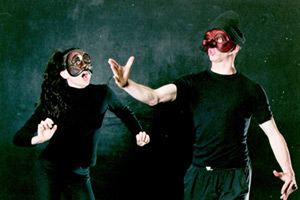 The students will
explore the fundamental principles of all the performing arts through the
observation and re-creation of the moving world, involving a more profound
understanding of the dynamics of life through use of the performer's body. The students will
explore the fundamental principles of all the performing arts through the
observation and re-creation of the moving world, involving a more profound
understanding of the dynamics of life through use of the performer's body.These principles, applied to dramatic creation, performing and acting, allow the students to make links between life and art,and to re-create the world on stage not only as it is,but as they imagine it to be. Initiation Course: The course focuses on the observation of life as a fundamental necessity for every creative act. This involves stimulating the students curiosity, playfulness and sense of beauty.There is an evolution in the work from the study of the familiar world of visible movements in nature and human life,to the more mysterious worlds of the hidden movements in architecure,painting and poetry.This approach enriches the students sensitivity towards the world and touches the poetic dimension within them.The teaching of this course forms a complete unit in itself. It offers not only a preparation for the demands of different performing styles, but in its holistic approach goes far beyond the arts to stimulate the students interest in other fields of knowledge. It is open to students who have already some experience in the performing arts,whether as actors, performers or dancers, and who wish to enhance their creative potential. Advanced Course: The Advanced Course is specifically designed for theatre artists who have the desire to create original work and covers all the main areas in drama.It seeks to discover the driving forces within each genre, empowering the students to go beyond existing styles to create their own theatre - young,vital and contemporary.It is open to students who have completed the Initiation Course at LISPA and have shown ability in dramatic creation, and also to students who have a strong background in physical theatre and dramatic creation and wish to extend their experience. |
||
 |
||
|
||
- Physical and vocal preparation - Dramatic Acrobatics - Movement analysis and applied techniques - Dramatic storytelling - Epic drama and melodrama - Commedia dell'arte - Human comedy - Grotesque theatre - The world of the Mysterious and the Fantastical - Chorus and hero in classic tragedy and modern drama - The clown - The world of comics - The cabaret - Approach to classic and modern text Creation Each week the students receive a theme to create their own theatre.The results are presented at the end of each week to the teachers and the students. Public Presentations The students periodically present their work in public performances Final projects At the end of the year the students work over a longer period of time on individual projects of their choice to share the theatre of their interest with an audience. The studies of the Advanced Course cover 35 hours a week and include classtime,preparation and rehearsal. |
||
 |
||
This programme is open to students,who have completed the Initiation Course and the Advanced Course at LISPA and show a strong interest in a creative pedagogy for the performing arts. For detailed information about this programme please contact the school. MFA in Physical Theatre NAROPA UNIVERSITY (USA) offers interested students the possibility to attain a Master of Fine Arts degree in Physical Theatre in London in cooperation with LISPA. For further information please contact LISPA or the admission office at Naropa University. [email protected] [email protected] |
||